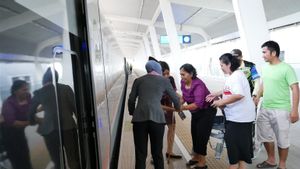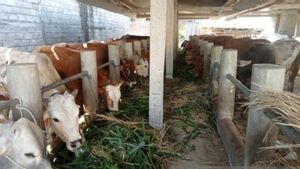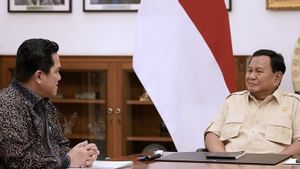JAKARTA - Indonesia's Center of Reform on Economics (CORE) assesses that the Omicron COVID-19 variant will not affect the 2022 economy massively as long as the government chooses the right health treatment.
"If health management is carried out optimally, then we can hope that this year's trend of economic performance will at least not be massively disrupted," said CORE Indonesia Economist Yusuf Rendy Manilet as quoted by Antara, Monday, January 31.
Yusuf assessed that the short-term impact of omicron on the economy will depend on the government's response to the increase in omicron cases in at least the last two weeks.
Learning from the experience of the Delta variant that occurred in July, with the rapid increase in cases generally it will encourage the government to limit community mobility activities. With the limited mobility of the community, of course it will limit economic activity.
"The estuary will have an impact on economic activity in the first quarter, in particular, there is the potential for economic growth to be quite low if the approach taken is not fast and also increases from Omicron throughout February and also March," he said.
To anticipate the impact of the decline in economic growth in the first quarter due to the Omicron variant, he advised the government to be faster in encouraging anticipatory steps for the spread of the Omicron variant. So that the impact will not be felt until at least until March.
"My assumption is that February will be a month in which the government will focus on handling Omicron," he said.
Regarding the long-term impact of Omicron on the economy, he continued, it will depend on how it is handled and also how long Omicron extends in society.
Yusuf also reminded the government to take a number of anticipatory measures, such as accelerating vaccination in areas with low vaccination percentages by focusing on vulnerable groups of people. Then, increasing the capacity of testing, tracing and isolation, including by maximizing the role of Pedulilindungi which can be a kind of tool to make people who, for example, work outside, more alert to the spread of Omicron variants.
In addition, he also suggested that activities such as face-to-face meetings at schools might need to be considered temporarily postponed so that they could be changed back to distance learning in order to break the chain of distribution.
"The government needs to look at the development situation of Omicron, if for example it turns out that this variant will take longer, of course it is also necessary to start considering the variant of assistance that will be provided by the government to the community," said Yusuf.
The English, Chinese, Japanese, Arabic, and French versions are automatically generated by the AI. So there may still be inaccuracies in translating, please always see Indonesian as our main language. (system supported by DigitalSiber.id)













